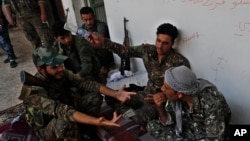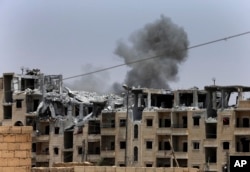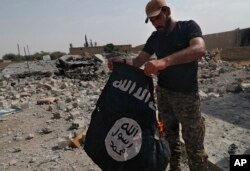As fighting flared in parts of Syria on Wednesday, a U.S.- and Russian-backed cease-fire in the south appeared to be holding. U.S. officials said Russia has offered to send observers to the area to monitor the truce.
Brett McGurk, the U.S. special envoy for the anti-IS coalition, said last week that the U.S. has had "constructive" talks with Russian military officials on Syria in recent weeks and that both sides were keen to explore the possibility of cease-fires in other areas of the country.
Despite talk of enlarging the cease-fire, fighting flared up in the rebel-held province of Idlib, near the Turkish border. Arab media reported that fighters from two rival Islamic militant groups, the former Jabhat al-Nusra and the Ahrar al-Sham, battled each other using heavy weapons.
In the north of Syria, Islamic State militants were pushed back from southern sections of their base, Raqqa, according to the Britain-based Syrian Observatory for Human Rights. Arab media also reported clashes between Kurdish militia fighters and Turkish-backed Syrian rebels north and east of Aleppo. It said Turkey demanded the return of the bodies of several of its men killed in the clashes.
In the east of the country, Syrian state TV reported that IS militants had "fled en masse" from their stronghold inside Al Mayadeen, near the strategic eastern desert city of Deir ez-Zor.
The Saudi-owned al Hayat daily reported that Syrian government forces had captured large chunks of territory outside Deir ez-Zor and were 10 kilometers from the city. Syrian government forces have long controlled portions of Deir ez-Zor, but were under siege by IS militants surrounding them.
Syrian state TV also showed video of villagers rejoicing after government forces recaptured several villages in central Hama province. One man on camera said residents were elated after Islamic militants had been driven out of their town.
Meanwhile, Russian politicians have approved a plan for keeping forces in Syria for decades to come.
In January, the two nations signed agreements that would extend Russia's control of its Tartus naval facility for 49 years and give it sovereignty over the territory. The term can be automatically extended for additional 25-year periods if neither side objects. The deal also allowed Russia to modernize the site so that it can host up to 11 ships; it now has room for only a couple of midsized ships at a time.
The Tartus facility is the only such outpost Russia has outside the former Soviet Union. The Russian military has used Tartus to back its campaign in support of Syrian President Bashar al-Assad.
Some information for this report came from AP.



